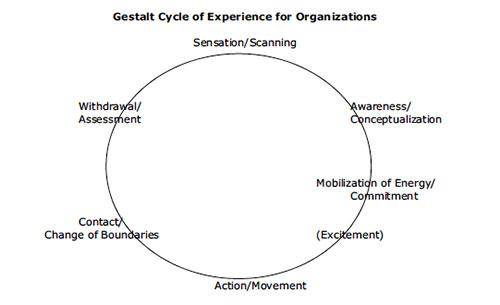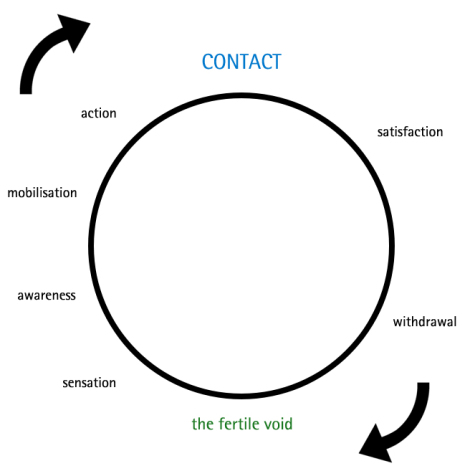When was it I promised I’d teach you The Cycle of Experience? A month ago?
I’ve change my mind. And, I finished the post last week.
[learn_more caption=”It’s here if you are still interested. Images don’t copy, so they are in the post itself.”] You’re sitting in your chair, comfortably reading that book you’ve been wanting to get to. All is well with your world.
A vague sensation arises in your stomach; perhaps it rumbles? You easily identify this sensation as hunger, but you ignore it; you want to finish the chapter you are in.
Eventually, the pangs become strong enough that you look at your watch and discover it’s lunch time. Where has the time gone? No wonder you are hungry.
You think about what you’d like to eat. Maybe you’ll have that left over pizza from the night before? Ooooh, how you’d enjoy that!
You set your book down and walk to the refrigerator, pizza on your mind.
Let’s interrupt this scenario and look at the image below; one of countless versions of what Gestalt therapists and theorists refer to as the Gestalt Cycle of Experience.
In this image,(A) from the Gestalt Institute of Cleveland’s Organizational Development Training Program, there are six stages. Starting at the top, at twelve o’clock, and moving clockwise, you can see the four stages we’ve just gone through in our little scenario:
- Sensation (a dull, achy knot in your stomach)
- Awareness (you identify the sensation, give it a name),
- Mobilization of energy (think about what you’ll have for lunch — even feeling that little burst of excitement at the thought of the pizza) — and finally,
- Action, (you get up and move to the refrigerator).
Gestalt theory holds that these stages occur in all human activity. In our example we used hunger. Thirst is also used as an example (the Gestaltists really like their food and drink metaphors). Restlessness, boredom, and romance work just as well. The number is limited only by your imagination. You get the idea.
Let’s get back to lunch.
And the fifth stage: Yum: CONTACT (image B)
The eating — chewing, tasting, and swallowing — of that pizza occurs at the point we call Contact and it is, frankly, what Gestalt therapy is about: making contact — with ourselves, others, and our environment (including the pizza).
Let’s return to the Cycle of Experience.
There are dozens of variations on this model and, in the next image (C), below, Contact is now on top and an additional stage has snuck in between Contact and Withdrawal — Satisfaction — making this now a seven point cycle. ( I really must find someone in Cleveland’s Organizational Development program and see why they don’t include “satisfaction” on their cycle for organizations.)
We’re also interested in what happens after Contact. The model I’ve adopted offers two points:
6. Satisfaction: Do we fully enjoy the moment, savoring every bite? And,
7. Withdrawal: Do we stop when we feel sated? Can we say good-bye? Do we feel a sense of lightness as we let go of something that has weighed us down?
This is how a healthy cycle of the experience flows, in seven stages from Sensation (now at 7 o’clock) clockwise to Withdrawal (at about 4:30).
But alas, no one comes to see a therapist about moving fluidly through these seven points (or six) in the cycle. No; it’s the interruptions along the way, the creative ways we might resist at each point, that make for interesting therapy sessions.
It’s the client who’s alienated from her body so that physical or emotional sensations don’t have a chance to make their case to her, or the woman so saddled with a fixed belief system that she can’t identify the sensations she does feel, in a way that will help her meet her need. These and many others are what keep me eager to meet my next client.
I don’t want to get too far into the interruptions — we only talked about two — only to let you know they can be powerful and subtle and worth understanding.
It’s good to remember that we all have multiple Cycles of Experience operating at any given time.
I’m sitting at my desk writing and have been most of the day. My butt is weary and would like me to take a walk, but I really want to get the first draft of this post done so I can let it sit overnight and revisit it in the morning. I ignore the discomfort.
All that talk of pizza has made me wish for something to eat, but not pizza; I had that for lunch today. And Woody made me that lunch, because he loves to cook for me, which — when I pay attention to that fact — leaves me feeling loved and cared for. But today I glossed over that fact.
There’s a hum I hear from a motor outside and it’s distracting me from what I want to write here.
Competing sensations, competing needs. When we’re aware of them, great. We have choices. It’s when they function out of our conscious awareness, when we wind up making the same decisions over and over, or when we feel stuck that a compassionate, courageous, and curious therapist can be of help.
How about you? Where do you get stuck in this Cycle of Experience? [/learn_more]
BUT, it turned into too much talking ABOUT. Dense, academic, wonky.
I don’t do that with you. I like to think I talk WITH you. I speak (I go first; it’s the way it works) and you respond in the Comments. Sometimes we have a little exchange. Back when Ian was with us, those exchanges were more frequent, but still, some of you engage with me.
I like that. I love the sense that we are making a connection through this blog. Contact, if you will — if you read the Cycle of Experience post in the Learn More window. I love the idea many of you have expressed to me that I get you to think anew. Hearing that makes my heart do a little backflip. Exhilarating!
So, I’ve buried the academic, jargony, wonky, dense Cycle of Experience. Curious about the images you would have seen, had I posted it in its original form? Here they are.
A

B

C

I’m struck as I write this with how at the root, at the bottom of our behaviors, there is always a theory, a core belief that informs our action, or a hypothesis we are testing. We are not always aware of them. I’d guess we are rarely aware of them.
And, I’ll be the first to suggest that analyzing each and every action can be problematic, mindfulness meditation notwithstanding. At the same time, knowing that they exist, that when you get curious about WHY you just did what you did, or WHY you keep doing what hasn’t yet worked well for you, there is a way to understand.
Until then, remember my motto:
Enjoy life; It may well be the only one we get.
How about you? How interested are you in the underlying reason for anything? Does the thought of analysis draw you in or turn you away?
Next week: My Look At Seventy
Marian Beaman
I don’t think it’s intended as such, but if the cycle of experience you posted can be aligned with the human life cycle, I suppose I’d be at the “withdrawal/assessment” point. I’m not trained in Gestalt theory, but I do admit to a penchant of analysis and assessment. When things happen, I want to know why.
I know you miss Ian, your British friend who was often your first commenter here. Thanks for the insight in this post; I look forward to your look at seventy next week. Enjoy your day!
Janet Givens
Hi Marian,
It’s funny you mentioned this. Just the other day, as I was revamping it into what it became, I too experimented with putting my 7 decades onto the cycle — one for each point, I wondered? Alas. I didn’t work. But it was fun trying.
I was thinking how important it is for me to know the backstory of what someone does, particularly when they are attempting to be therapeutic. I took a few sessions with someone a few years ago because I was really curious what she did and she hadn’t been able to explain it to me. I paid for three sessions, went for two, and still don’t understand what she does (or why). And then I remember what my Kazakh colleague Assem said to me: “All you Americans ask ‘why’ all the time!” Yes; I guess we do.
Janet Givens recently posted…Where Are You in the Cycle of Experience?
Marian Beaman
: D
Merril Smith
Good morning, Janet. I just read the part you didn’t officially publish. It’s not what I consider academic at all. The graphics made no sense to me without the context. So, I guess that answers your question about wanting to know the underlying reasons for things.
I also understand the wanting to engage with people in comments. There is someone who regularly retweets my posts (which is nice), but I don’t think she ever reads them. At the same time, I understand it is difficult to keep up with everyone.
Janet Givens
Good afternoon, Merril. (I’ve been out finding a used back door — long story)
(I’ve been out finding a used back door — long story)
I think our brains work in similar fashion and we are attracted to the theoretical. My concern I think had more to do with presenting a HERE IT IS or Here is THE way when that’s really the last thing I want to do. I wanted to present the main fundamentals of the work I do, but I also wanted it to stay engaging. You’ve probably also noted the dramatic downturn in numbers of comments this month. So, I just copied and pasted it in that great little Learn More window and proceeded to find a question I was also interested in. I’m glad I did.
And glad you weighed in once again. Thanks.
Janet Givens recently posted…Where Are You in the Cycle of Experience?
susan scott
Yes, I’m interested in the underlying reason for everything. It drives me nuts. Because it means hard work on my side, to get to underlying motivations inter alia – and seeking the hidden agenda therein if applicable –
But, I can get too much into my head. So sometimes I do something else, like walk, or read or paint or day dream. Jung said something along the lines of – the hands often work out or express what the head cannot. Painting, or doodling, or playing with eg clay is creative, hands on, and it helps (I like to think) with any writing I may be working on. It gives the head stuff a much needed break.
susan scott recently posted…International Nelson Mandela Day
Janet Givens
Ah, so (according to Jung) when you are walking or painting or day dreaming you are also working out some premise in your head. I like that. Along a similar line, I love Melody Beattie’s quote that “our friends are a reflection of the issues we’re working on.” So, Jung might say your play is a reflection of the issues you’re working on. ?? Nice.
I too know the down side of being “too much in my head.” And, I wish I knew more about Jung. From the little I know I see him focused on symbols, the symbolic. Quite removed from the Gestaltists “experience” as the focus. Would that be correct?
Janet Givens recently posted…Where Are You in the Cycle of Experience?
Joan Z. Rough
Yes, I always want to know the why of things, but not necessarily in a technical way. Diagrams usually turn my curiosity off. I guess I’m more of a philosopher looking at the mystery, rather than the reason.
Joan Z. Rough recently posted…Retirement Anyone?
Janet Givens
Hi Joan. I think I agree to a point. I too like the mystery part of things; the questions rather than the answers; the journey rather than the destination. Is that what you were referring to? Each training center, I discovered to my surprise, has its own version of this Cycle. I think it’s more a way of focusing the mind, a diagnostic tool in a way. And, I’m eager to see yet another diagram come out, this one with nine points, or four. In fact, in my notes from training days, I noted a four point cycle: (1) Ask ‘What do I need?’ (2) Get it (3) Savor it (4) Be open to what comes next. Don’t know who’s it is; I may have been daydreaming at the time. This is all to say this one is not fixed in stone, anywhere.
Now let’s get back to enjoying that journey. Thanks for adding your voice.
Janet Givens recently posted…Where Are You in the Cycle of Experience?
Laurie Buchanan
Janet — I’m with Joan, I want to know the why of things, but not necessarily in a technical way.
Janet Givens
Hi Laurie. Now I’m wondering what “a technical way” means. I wonder if this has more to do with how varied are the ways in which different people learn. For me, I can’t just hear something; I must take notes; I still have outlines I did in undergrad classes. Some profs were easier to outline than others. I can’t just see something either; I always read a book with a pen in my hand (very hard to do on my Kindle; it’s a problem). Kinetic is my path. I want to touch, feel, massage. That’s the only way I could ever learn statistics in Soc. I had to manipulate the data, see the different “truths” that emerged from the different sorts. I found it fascinating. Is that what you mean by technical? Those rather annoying details that can get so tangled up?
Janet Givens recently posted…Where Are You in the Cycle of Experience?
Tim Fearnside
Janet, this won’t surprise you, but I also love to probe the reasons behind things, and enjoy analysis in my way. But like Susan, above, I’m also prone to overanalyzing, and can easily get stuck in my own head. Sometimes, the answer isn’t a quotient, which is something that’s taken me a long time to begin to understand. It’s not surprising to me that your readers are likewise prone to seeking the “why,” which, I imagine, is what brings them back. You do a nice job of floating ideas out for the rest of us to chew on :).
Janet Givens
I thank you Tim. And welcome back. Let’s all chew away. I see us gathered around a giant spittoon so we can spit out the ideas we (personally) don’t care for, and swallow the rest. There’s that food/digestion metaphor again. Help me!
Janet Givens recently posted…Where Are You in the Cycle of Experience?